2024年中考英语语法复习-过去完成时课件(共28张PPT)
文档属性
| 名称 | 2024年中考英语语法复习-过去完成时课件(共28张PPT) | 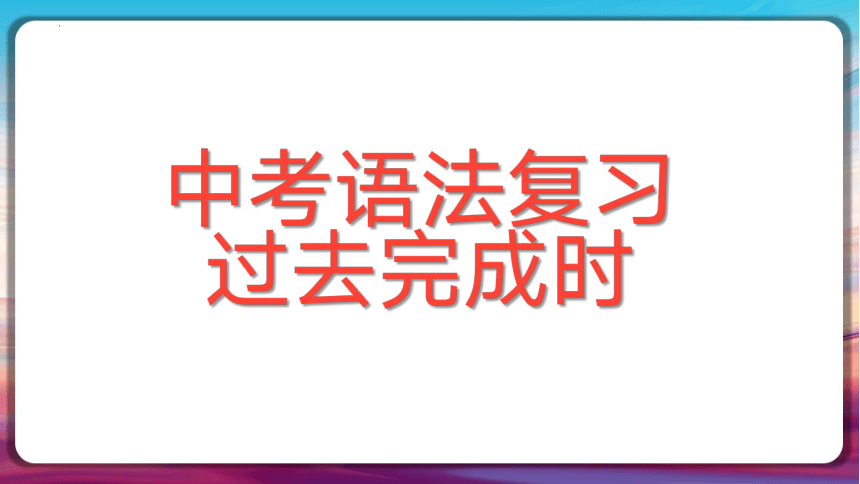 | |
| 格式 | pptx | ||
| 文件大小 | 10.8MB | ||
| 资源类型 | 教案 | ||
| 版本资源 | 通用版 | ||
| 科目 | 英语 | ||
| 更新时间 | 2024-06-12 06:27:10 | ||
图片预览

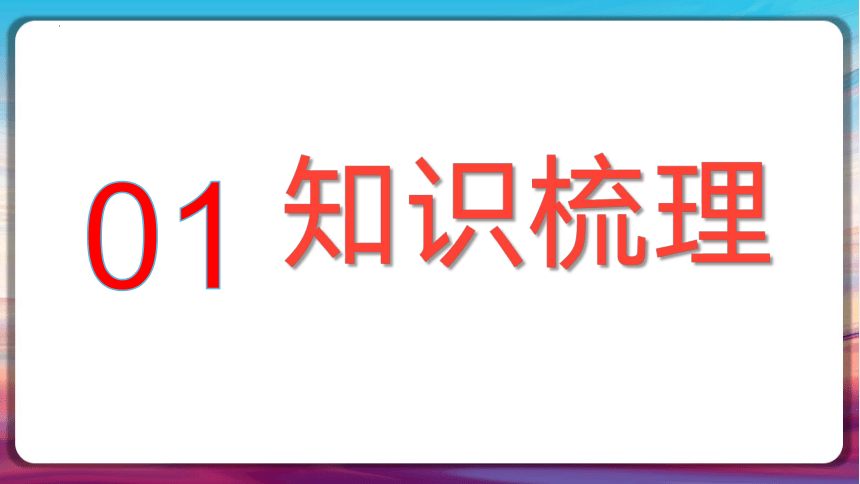
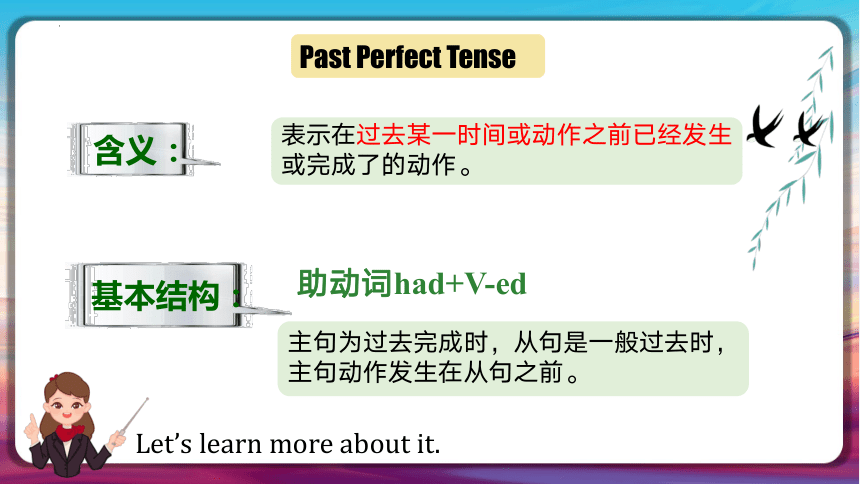
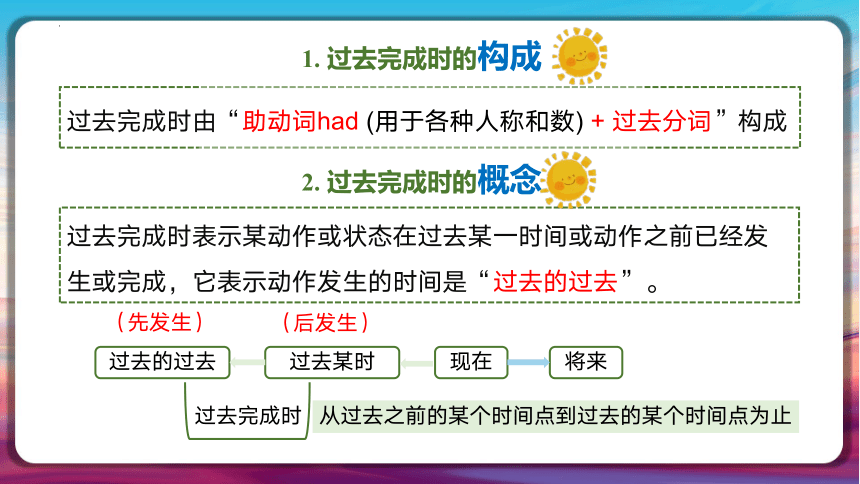
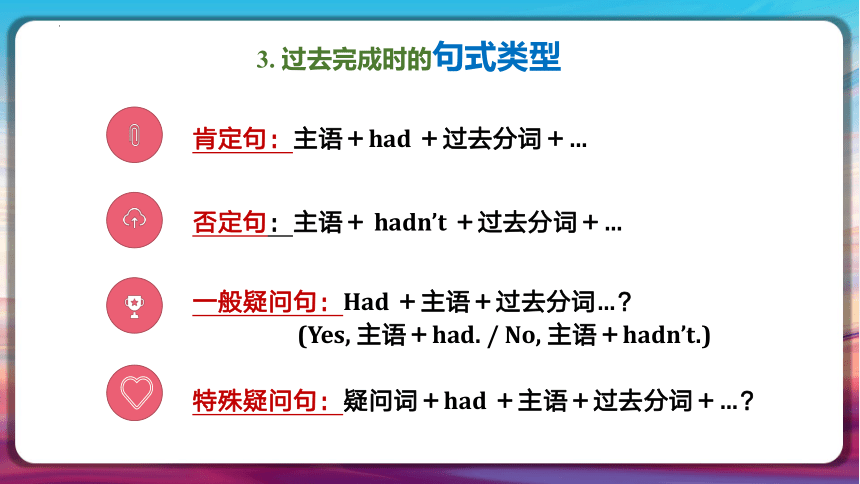
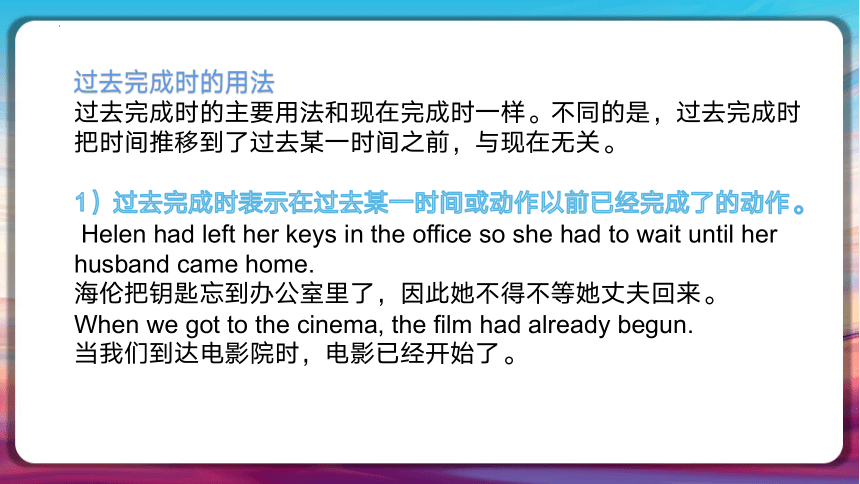
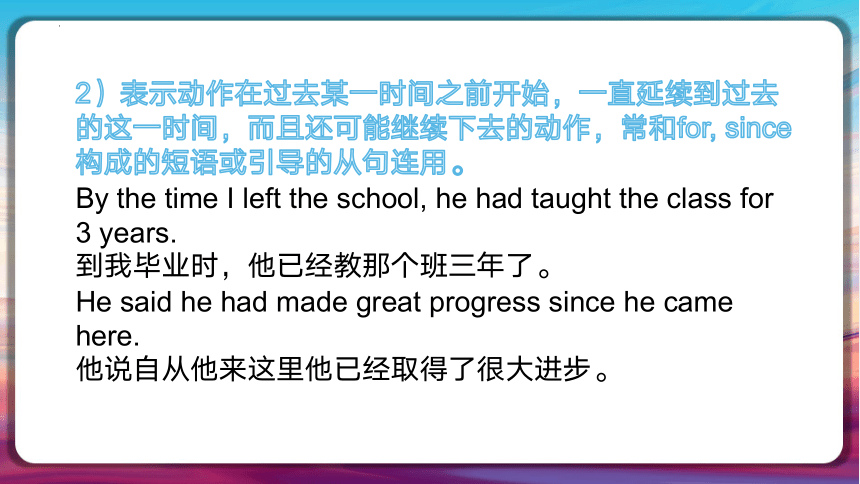
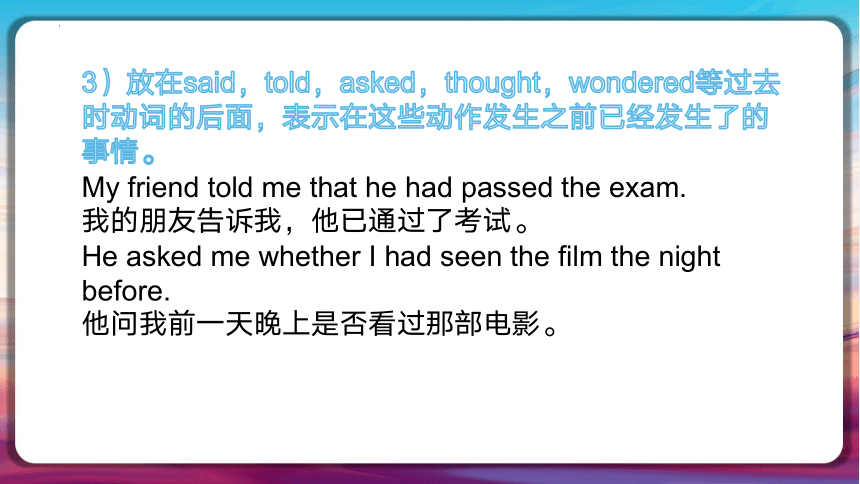
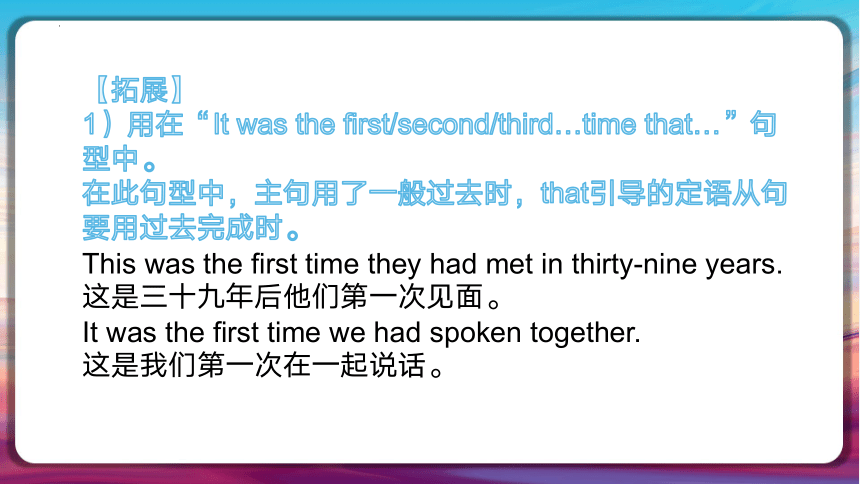
文档简介
(共28张PPT)
中考语法复习
过去完成时
知识梳理
01
含义:
基本结构:
表示在过去某一时间或动作之前已经发生或完成了的动作。
助动词had+V-ed
Past Perfect Tense
主句为过去完成时,从句是一般过去时,
主句动作发生在从句之前。
Let’s learn more about it.
过去完成时由“助动词had (用于各种人称和数) + 过去分词”构成
过去的过去
过去某时
现在
将来
过去完成时
从过去之前的某个时间点到过去的某个时间点为止
(先发生)
(后发生)
1. 过去完成时的构成
2. 过去完成时的概念
过去完成时表示某动作或状态在过去某一时间或动作之前已经发生或完成,它表示动作发生的时间是“过去的过去”。
3. 过去完成时的句式类型
肯定句:主语+had +过去分词+…
否定句:主语+ hadn’t +过去分词+…
一般疑问句:Had +主语+过去分词…?
(Yes, 主语+had. / No, 主语+hadn’t.)
特殊疑问句:疑问词+had +主语+过去分词+…?
过去完成时的用法
过去完成时的主要用法和现在完成时一样。不同的是,过去完成时把时间推移到了过去某一时间之前,与现在无关。
1)过去完成时表示在过去某一时间或动作以前已经完成了的动作。
Helen had left her keys in the office so she had to wait until her husband came home.
海伦把钥匙忘到办公室里了,因此她不得不等她丈夫回来。
When we got to the cinema, the film had already begun.
当我们到达电影院时,电影已经开始了。
2)表示动作在过去某一时间之前开始,一直延续到过去的这一时间,而且还可能继续下去的动作,常和for, since构成的短语或引导的从句连用。
By the time I left the school, he had taught the class for 3 years.
到我毕业时,他已经教那个班三年了。
He said he had made great progress since he came here.
他说自从他来这里他已经取得了很大进步。
3)放在said,told,asked,thought,wondered等过去时动词的后面,表示在这些动作发生之前已经发生了的事情。
My friend told me that he had passed the exam.
我的朋友告诉我,他已通过了考试。
He asked me whether I had seen the film the night before.
他问我前一天晚上是否看过那部电影。
【拓展】
1)用在“It was the first/second/third…time that…”句型中。
在此句型中,主句用了一般过去时,that引导的定语从句要用过去完成时。
This was the first time they had met in thirty-nine years.
这是三十九年后他们第一次见面。
It was the first time we had spoken together.
这是我们第一次在一起说话。
2)当before , after, as soon as 等引导的从句里的动作与主句的动作紧密衔接时,由于这些连词本身已经说明了两个动作发生的先后关系,因此两个动作均可用一般过去时表示。
We had breakfast after we did morning exercises.
做完早操之后,我们吃早饭。
The train started to move just before we reached the station.
我们到车站时火车刚开动。
As soon as they got there, they started to study.
他们一到那里就开始学习了。
1. 由时间状语来判定
(1) by + 过去的时间点。
I had finished reading the novel by nine o'clock last night.
昨天晚上九点前我已经读完这本小说了。
(2) by the end of + 过去的时间点。
到...为止
(3) before + 过去的时间点。
在...之前
过去的过去,先发生
4. 过去完成时的判断依据
(1) 宾语从句中: 当宾语从句的主句为一般过去时,且从句的动作先于主句的动作时,从句要用过去完成时。在told, said, knew, heard, thought等动词后的宾语从句中。
如:
She said that she had seen the film before.
她说她以前看过这电影。
看电影是在她说之前做的。
4. 过去完成时的判断依据
2. 由“过去的过去”判定
(2) 状语从句 : 在时间、条件、 原因、 方式等状语从句中,
主、从句的动作发生有先后关系,动作在前的,要用过去完成时,动作在后的要用一般过去时。
如:
When I got to the station, the train had already left.
当我到达车站时,火车已经离开了。
2. 由“过去的过去”判定
火车离开发生在我到达车站之前。
4. 过去完成时的判断依据
时态 概念 常见的时间状语 例句
一般过去时 在过去某个时间发生的动作或存在的状态。 yesterday, last week, ago, just now等 The film started ten minutes ago.
现在完成时 过去发生或已经发生的动作对现在造成的影响。 just, never, ever, so far, already, since, for等 The film has already started.
过去完成时 在过去某个时间或动作之前就已发生的动作,即表示动作发生的时间是“过去的过去”。 by the time+从句;by the end of last+时间段; before+过去时间状语等 By the time they arrived at the cinema, the film had started.
过去完成时与一般过去时、现在完成时的用法区别
现在完成时
此处的情境强调“离开”的动作对现在的影响:公交车已经离开,现在已不在公交车站,故用现在完成时。
The bus has already left.
过去完成时
此处的情境强调“我到达车站时,公交车已经离开”,即表示“公交离开”的动作发生在“到达车站”之前,即“过去的过去”,故用过去完成时。
When I got to the bus stop, the bus had already left.
一般过去时
此处的情境强调“公交离开”的动作是五分钟前发生的,故用一般过去时。
The bus left five minutes ago.
过去
过去的过去
now
By the time she ________________, somebody had ____________in the bathroom.
在…之前
过去的过去用过去完成时,结构:had+过去分词
got up
gotten
Think and say
Look at the pictures. What happened to the girl
She ran to catch the bus.
The bus just left.
过去
过去的过去
now
By the time she ________________, the bus had ____________.
在…之前
过去的过去用过去完成时,结构:had+过去分词
went outside
left
Think and say
Look at the pictures. What happened to the girl
She got to school and realized she had left her bag at home.
过去
过去的过去
now
When she ________________, she realized her backpack had _______in the bathroom.
当…的时候
过去的过去用过去完成时,结构:had+过去分词
got to school
left
Think and say
过去完成时
(1) 构成:由“助动词had(用于各种人称和数) + 过去分词”构成。
否定式:had not + 过去分词
缩写形式:hadn’t
(2) 用法:过去完成时表示在过去某一时间或动作之前已经发生或完成了的动作。
(3) 它所表示动作发生的时间是“过去的过去”。
① 表示过去某一时间可用by, before等构成的短语来表示。
② 也可以用when, before等引导的时间状语从句来表示。
③ 还可以通过状语从句或通过上下文暗示。
When I got there, you had already eaten your meal.
当我到达那里时,你已经开始吃了。
By the time he got here, the bus had left.
在他到达那里之前,公共汽车已经离开了。
模拟练习
02
1. Tom was disappointed that most of the guests ______ when he ______ at the party.
A. left,had arrived
B. left,arrived
C. had left,had arrived
D. had left,arrived
2. We ______ four thousand new words by the end of last year.
A. had learned
B. have learned
C. learned
D. will have learned
3. The pen I ______ I ______ is on my desk.
A. think,lost
B. thought,had lost
C. think,had lost
D. thought,have lost
4. —Did you see Mr. Smith when you were in France?
—No, when I _____ France, he ______ to China.
A. had arrived, had gone
B. arrived to, went
C. got to, had gone
D. had got to, would go
5. Catherine ______ the letter before her mother came into her bedroom.
A. had written
B. was written
C. has written
D. is writing
6.—I have bought you the books you want.
—Oh,good,I afraid you had forgotten.
A.was B.am C.had been D.have been
1. D。句意为“汤姆很失望,当他到达宴会时,大部分客人已经走了”。guests先“离开”,Tom后“到达”。
2. A。根据by短语中的last year可知“到去年年末已经完成的动作”。
3. B。句意为“那支我以为已经丢了的钢笔就在我的桌子上”。“丢笔”是在“认为”之前发生的动作。
4. C。when引导的从句用一般过去时,主句用过去完成时,表示“过去的过去”。
5. A。before引导的从句用一般过去时,主句动作表示“过去的过去”,用过去完成时。
6. A。句意为“我担心你已经忘记了”。这里从句用了过去完成时,所以主句要用一般过去时。
thanks
中考语法复习
过去完成时
知识梳理
01
含义:
基本结构:
表示在过去某一时间或动作之前已经发生或完成了的动作。
助动词had+V-ed
Past Perfect Tense
主句为过去完成时,从句是一般过去时,
主句动作发生在从句之前。
Let’s learn more about it.
过去完成时由“助动词had (用于各种人称和数) + 过去分词”构成
过去的过去
过去某时
现在
将来
过去完成时
从过去之前的某个时间点到过去的某个时间点为止
(先发生)
(后发生)
1. 过去完成时的构成
2. 过去完成时的概念
过去完成时表示某动作或状态在过去某一时间或动作之前已经发生或完成,它表示动作发生的时间是“过去的过去”。
3. 过去完成时的句式类型
肯定句:主语+had +过去分词+…
否定句:主语+ hadn’t +过去分词+…
一般疑问句:Had +主语+过去分词…?
(Yes, 主语+had. / No, 主语+hadn’t.)
特殊疑问句:疑问词+had +主语+过去分词+…?
过去完成时的用法
过去完成时的主要用法和现在完成时一样。不同的是,过去完成时把时间推移到了过去某一时间之前,与现在无关。
1)过去完成时表示在过去某一时间或动作以前已经完成了的动作。
Helen had left her keys in the office so she had to wait until her husband came home.
海伦把钥匙忘到办公室里了,因此她不得不等她丈夫回来。
When we got to the cinema, the film had already begun.
当我们到达电影院时,电影已经开始了。
2)表示动作在过去某一时间之前开始,一直延续到过去的这一时间,而且还可能继续下去的动作,常和for, since构成的短语或引导的从句连用。
By the time I left the school, he had taught the class for 3 years.
到我毕业时,他已经教那个班三年了。
He said he had made great progress since he came here.
他说自从他来这里他已经取得了很大进步。
3)放在said,told,asked,thought,wondered等过去时动词的后面,表示在这些动作发生之前已经发生了的事情。
My friend told me that he had passed the exam.
我的朋友告诉我,他已通过了考试。
He asked me whether I had seen the film the night before.
他问我前一天晚上是否看过那部电影。
【拓展】
1)用在“It was the first/second/third…time that…”句型中。
在此句型中,主句用了一般过去时,that引导的定语从句要用过去完成时。
This was the first time they had met in thirty-nine years.
这是三十九年后他们第一次见面。
It was the first time we had spoken together.
这是我们第一次在一起说话。
2)当before , after, as soon as 等引导的从句里的动作与主句的动作紧密衔接时,由于这些连词本身已经说明了两个动作发生的先后关系,因此两个动作均可用一般过去时表示。
We had breakfast after we did morning exercises.
做完早操之后,我们吃早饭。
The train started to move just before we reached the station.
我们到车站时火车刚开动。
As soon as they got there, they started to study.
他们一到那里就开始学习了。
1. 由时间状语来判定
(1) by + 过去的时间点。
I had finished reading the novel by nine o'clock last night.
昨天晚上九点前我已经读完这本小说了。
(2) by the end of + 过去的时间点。
到...为止
(3) before + 过去的时间点。
在...之前
过去的过去,先发生
4. 过去完成时的判断依据
(1) 宾语从句中: 当宾语从句的主句为一般过去时,且从句的动作先于主句的动作时,从句要用过去完成时。在told, said, knew, heard, thought等动词后的宾语从句中。
如:
She said that she had seen the film before.
她说她以前看过这电影。
看电影是在她说之前做的。
4. 过去完成时的判断依据
2. 由“过去的过去”判定
(2) 状语从句 : 在时间、条件、 原因、 方式等状语从句中,
主、从句的动作发生有先后关系,动作在前的,要用过去完成时,动作在后的要用一般过去时。
如:
When I got to the station, the train had already left.
当我到达车站时,火车已经离开了。
2. 由“过去的过去”判定
火车离开发生在我到达车站之前。
4. 过去完成时的判断依据
时态 概念 常见的时间状语 例句
一般过去时 在过去某个时间发生的动作或存在的状态。 yesterday, last week, ago, just now等 The film started ten minutes ago.
现在完成时 过去发生或已经发生的动作对现在造成的影响。 just, never, ever, so far, already, since, for等 The film has already started.
过去完成时 在过去某个时间或动作之前就已发生的动作,即表示动作发生的时间是“过去的过去”。 by the time+从句;by the end of last+时间段; before+过去时间状语等 By the time they arrived at the cinema, the film had started.
过去完成时与一般过去时、现在完成时的用法区别
现在完成时
此处的情境强调“离开”的动作对现在的影响:公交车已经离开,现在已不在公交车站,故用现在完成时。
The bus has already left.
过去完成时
此处的情境强调“我到达车站时,公交车已经离开”,即表示“公交离开”的动作发生在“到达车站”之前,即“过去的过去”,故用过去完成时。
When I got to the bus stop, the bus had already left.
一般过去时
此处的情境强调“公交离开”的动作是五分钟前发生的,故用一般过去时。
The bus left five minutes ago.
过去
过去的过去
now
By the time she ________________, somebody had ____________in the bathroom.
在…之前
过去的过去用过去完成时,结构:had+过去分词
got up
gotten
Think and say
Look at the pictures. What happened to the girl
She ran to catch the bus.
The bus just left.
过去
过去的过去
now
By the time she ________________, the bus had ____________.
在…之前
过去的过去用过去完成时,结构:had+过去分词
went outside
left
Think and say
Look at the pictures. What happened to the girl
She got to school and realized she had left her bag at home.
过去
过去的过去
now
When she ________________, she realized her backpack had _______in the bathroom.
当…的时候
过去的过去用过去完成时,结构:had+过去分词
got to school
left
Think and say
过去完成时
(1) 构成:由“助动词had(用于各种人称和数) + 过去分词”构成。
否定式:had not + 过去分词
缩写形式:hadn’t
(2) 用法:过去完成时表示在过去某一时间或动作之前已经发生或完成了的动作。
(3) 它所表示动作发生的时间是“过去的过去”。
① 表示过去某一时间可用by, before等构成的短语来表示。
② 也可以用when, before等引导的时间状语从句来表示。
③ 还可以通过状语从句或通过上下文暗示。
When I got there, you had already eaten your meal.
当我到达那里时,你已经开始吃了。
By the time he got here, the bus had left.
在他到达那里之前,公共汽车已经离开了。
模拟练习
02
1. Tom was disappointed that most of the guests ______ when he ______ at the party.
A. left,had arrived
B. left,arrived
C. had left,had arrived
D. had left,arrived
2. We ______ four thousand new words by the end of last year.
A. had learned
B. have learned
C. learned
D. will have learned
3. The pen I ______ I ______ is on my desk.
A. think,lost
B. thought,had lost
C. think,had lost
D. thought,have lost
4. —Did you see Mr. Smith when you were in France?
—No, when I _____ France, he ______ to China.
A. had arrived, had gone
B. arrived to, went
C. got to, had gone
D. had got to, would go
5. Catherine ______ the letter before her mother came into her bedroom.
A. had written
B. was written
C. has written
D. is writing
6.—I have bought you the books you want.
—Oh,good,I afraid you had forgotten.
A.was B.am C.had been D.have been
1. D。句意为“汤姆很失望,当他到达宴会时,大部分客人已经走了”。guests先“离开”,Tom后“到达”。
2. A。根据by短语中的last year可知“到去年年末已经完成的动作”。
3. B。句意为“那支我以为已经丢了的钢笔就在我的桌子上”。“丢笔”是在“认为”之前发生的动作。
4. C。when引导的从句用一般过去时,主句用过去完成时,表示“过去的过去”。
5. A。before引导的从句用一般过去时,主句动作表示“过去的过去”,用过去完成时。
6. A。句意为“我担心你已经忘记了”。这里从句用了过去完成时,所以主句要用一般过去时。
thanks
同课章节目录
- 词法
- 名词
- 动词和动词短语
- 动词语态
- 动词时态
- 助动词和情态动词
- 非谓语动词
- 冠词
- 代词
- 数词和量词
- 形容词副词及其比较等级
- 介词和介词短语
- 连词和感叹词
- 构词法
- 相似、相近词比较
- 句法
- 陈述句
- 一般疑问句和否定疑问句
- 特殊疑问句及选择疑问句
- 反意疑问句
- 存在句(There be句型)
- 宾语从句
- 定语从句
- 状语从句
- 主谓一致问题
- 简单句
- 并列句
- 复合句
- 主谓一致
- 主、表语从句
- 名词性从句
- 直接引语和间接引语
- 虚拟语气
- 感叹句
- 强调句
- 倒装句
- 祈使句
- 句子的成分
- 句子的分类
- 题型专区
- 单项选择部分
- 易错题
- 完形填空
- 阅读理解
- 词汇练习
- 听说训练
- 句型转换
- 补全对话
- 短文改错
- 翻译
- 书面表达
- 任务型阅读
- 语法填空
- 其他资料
